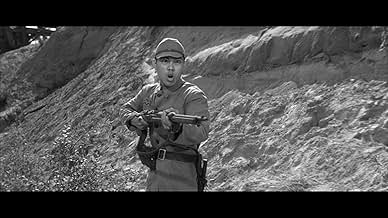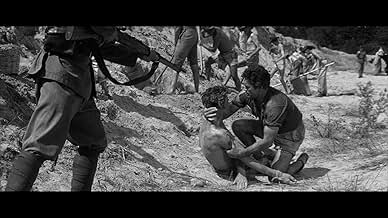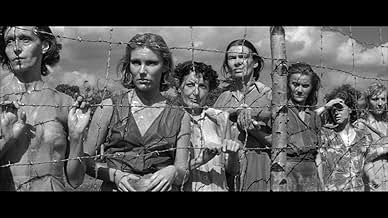The links with "Bridge on the River Kwai" go further than just the Japanese prison-camp setting and the presence of Andre Morell; there is the same theme of the commanding officer whose behaviour seems increasingly unreasonable in the face of the prisoners' privations, the lone American contrasted with the starved Commonwealth soldiers, and a morally ambiguous ending. In some ways this Hammer production suffers less from political compromise, not being required to introduce an American leading actor for the benefit of the US box office, but it has to be said that whatever flaws may exist in David Lean's film, "The Camp on Blood Island" is ultimately no competition. It's a decent and sometimes brave picture (even the women are shown hounding the suspected collaborator in their midst) but it doesn't hold the same seeds of greatness.
There is some fine acting on display, both from the actors playing the Japanese, who convey a sense of alien culture without becoming ridiculous, and those portraying the physically drained and starving prisoners: the opening shots of the young man struggling to dig his own grave are actively disturbing, both for his apparent emaciation and for his dragging movements of utter collapse. Andre Morell, of course, dominates the film as the obstinate and authoritarian Colonel Lambert, and in a sense the plot structure consists of gradually justifying his seemingly unreasonable behaviour -- but it is not that simplistic, and the revelation of the final consequences of his decisions (was it, ultimately, all unnecessary?) leaves a note of deliberate ambiguity.
The prisoners in the women's camp are, perhaps inevitably, shown as rather more glamorous than their male counterparts, with their fetching dishevelment a token gesture towards the starvation and illness stated in the script. Barbara Shelley, playing Kate, does appear rather too healthy in her close-ups for the degree of weakness and collapse she is supposed to portray during her escape. But unsurprisingly this is a male-dominated film, and all the really intriguing characters are male. Lambert himself, and the fretful diplomat Beattie, chafing under what he sees as the military mishandling of their situation. Father Paul, jeopardising his life and his cloth to pass messages via the medium of the funeral Mass. The former planter Van Elst, driven to repeated risky sabotage.
For a film that was condemned on release for its 'orgy of atrocities', "The Camp on Blood Island" is actually quite restrained in what is implied, let alone shown on screen: the horrors and Japanese 'bestiality' are as much psychological, based on petty humiliation and anticipation, as anything else. This is not torture porn -- the worst that we see is machine-gunning, plus one clean beheading. ("Bridge on the River Kwai" actually goes further in this respect.) But there is never any doubt that the prisoners' situation is horrific, and that ultimately they are prepared to throw lives away in a desperate attempt at group survival.




































